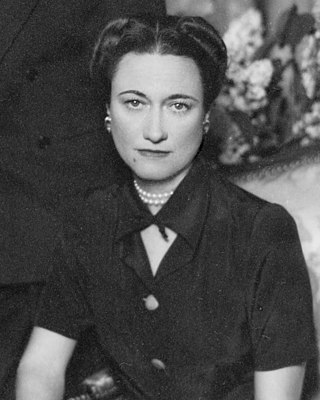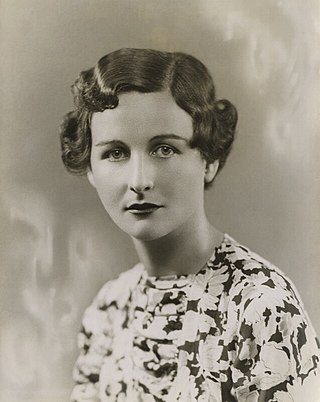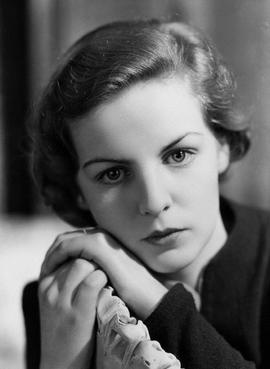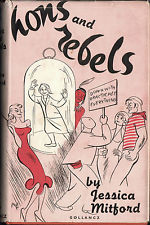
Wallis, Duchess of Windsor was an American socialite and wife of former king Edward VIII. Their intention to marry and her status as a divorcée caused a constitutional crisis that led to Edward's abdication.

Sir Oswald Ernald Mosley, 6th Baronet, was a British aristocrat and politician who rose to fame during the 1920s and 1930s when, having become disillusioned with mainstream politics, he turned to fascism. He was Member of Parliament (MP) for Harrow from 1918 to 1924 and for Smethwick from 1926 to 1931. He founded the British Union of Fascists (BUF) in 1932 and led it until its forced disbandment in 1940.

The Mitford family is an aristocratic English family whose principal line had its seats at Mitford, Northumberland. Several heads of the family served as High Sheriff of Northumberland.

Nancy Freeman-Mitford was an English novelist, biographer, and journalist. The eldest of the Mitford sisters, she was regarded as one of the "bright young things" on the London social scene in the inter-war period. She wrote several novels about upper-class life in England and France, and is considered a sharp and often provocative wit. She also has a reputation as a writer of popular historical biographies.

Unity Valkyrie Freeman-Mitford was a British socialite and member of the Mitford family known for her relationship with Adolf Hitler. Both in the United Kingdom and Germany, she was a prominent supporter of Nazism, fascism and antisemitism, and belonged to Hitler's inner circle of friends. When the United Kingdom declared war on Germany she attempted suicide in Munich by shooting herself in the head, surviving, but with extensive brain damage. She returned to England but never recovered, ultimately dying from consequences of the wound.

Deborah Vivien Cavendish, Duchess of Devonshire,, was an English aristocrat, writer, memoirist, and socialite. She was the youngest and last surviving of the six Mitford sisters, who were prominent members of British society in the 1930s and 1940s.

Diana, Lady Mosley, known as Diana Guinness between 1929 and 1936, was a British aristocrat, writer, editor and fascist sympathiser. She was one of the Mitford sisters and the wife of Oswald Mosley, leader of the British Union of Fascists.

The British Union of Fascists (BUF) was a British fascist political party formed in 1932 by Oswald Mosley. Mosley changed its name to the British Union of Fascists and National Socialists in 1936 and, in 1937, to the British Union. In 1939, following the start of the Second World War, the party was proscribed by the British government and in 1940 it was disbanded.
Nicholas Mosley, 3rd Baron Ravensdale,, was a British peer, novelist and biographer, including that of his father, Sir Oswald Mosley, the founder of the British Union of Fascists.

Mosley was a 1998 television serial produced for Channel 4 based on British fascist Sir Oswald Mosley's life in the period between the two world wars. The series was directed by Robert Knights, from a screenplay by Laurence Marks and Maurice Gran, both better known for their television comedy series. It was based on the books Rules of the Game and Beyond the Pale by Nicholas Mosley, Mosley's son.

Eva Anna Paula Hitler was a German photographer who was the longtime companion and briefly the wife of Adolf Hitler. Braun met Hitler in Munich when she was a 17-year-old assistant and model for his personal photographer, Heinrich Hoffmann. She began seeing Hitler often about two years later.

Hons and Rebels, originally published in the United States under the title Daughters and Rebels, is a 1960 autobiography by political activist Jessica Mitford, which describes her aristocratic childhood and the conflicts between her and her sisters Unity and Diana, who were ardent supporters of Nazism.

David Bertram Ogilvy Freeman-Mitford, 2nd Baron Redesdale,, was a British peer, soldier, and landowner. He was the father of the Mitford sisters, in whose various novels and memoirs he is depicted.
The Hitler family comprises the relatives and ancestors of Adolf Hitler, an Austrian-born German politician and the leader of the Nazi Party, who was the dictator of Germany, holding the title Chancellor of Germany from 1933 to 1945, and head of state as Führer und Reichskanzler from 1934 to 1945. Adolf Hitler had a central role in the rise of Nazism in Germany, provoking the start of World War II, and holding ultimate responsibility for the deaths of many millions of people during the Holocaust.

A Life of Contrasts is the autobiography of Diana Mosley, one of the Mitford sisters, that was first published in 1977. In 2002, she released a revised edition of the book. Subtitles vary between UK and US editions, and the cover and title page.

The Pursuit of Laughter is a 2008 collection of diaries, articles, reviews and portraits by Diana Mosley (née Mitford). The book was published by Gibson Square and edited by Martin Rynja. Mosley's sister, Deborah Cavendish, Duchess of Devonshire, provides the introduction. The title is a homage to another Mitford sister's book, Nancy Mitford's The Pursuit of Love.
The European was a limited-circulation political and cultural magazine published between 1953 and 1959. It was edited by Diana Mosley of the Mitford family. As Diana Mitford, Mosley had been one of the bright young things and had cultivated friendships with several of the contributors to the magazine. These included Ezra Pound, Henry Williamson, and Roy Campbell. The magazine was published by Euphorion Books, a publishing company formed by Mosley and her husband, Sir Oswald Mosley, founder of the pre-war British Union of Fascists.

Wigs on the Green is a 1935 satirical novel by Nancy Mitford. A roman à clef, it is notable for lampooning British fascism, specifically political enthusiasms of Mitford's sisters Unity Mitford and Diana Mosley.

The Union Movement (UM) was a far-right political party founded in the United Kingdom by Oswald Mosley. Before the Second World War, Mosley's British Union of Fascists (BUF) had wanted to concentrate trade within the British Empire, but the Union Movement attempted to stress the importance of developing a European nationalism, rather than a narrower country-based nationalism. That has caused the UM to be characterised as an attempt by Mosley to start again in his political life by embracing more democratic and international policies than those with which he had previously been associated. The UM has been described as post-fascist by former members such as Robert Edwards, the founder of the pro-Mosley European Action, a British pressure group and monthly newspaper.

















